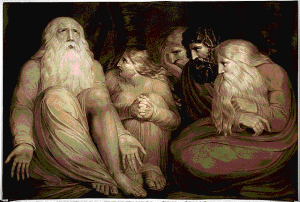I’m starting a meditative walk through the book of Job. Here is a man clearly loved by God, respected for his deeds, and yet who suffered terribly and entered into a time of doubt and failure. It is a perfect place to explore the mystery of the nature of the blessing of grace in the context of suffering and the absence of manifest material favor. Does grace equate with experiential blessing? Sometimes, but not always. Suffering is always unfortunate, but the hope is that we can be released from the pressure to always appear to be successful, that grace must have failed when things don’t go the way we hope.
First, the author establishes that Job is a truly righteous guy, and none of the subsequent events happen because he needs correction or punishment or discipline:
“There was a man in the land of Uz, whose name was Job; and that man was blameless and upright, and one who feared God and shunned evil. And seven sons and three daughters were born to him. Also, his possessions were seven thousand sheep, three thousand camels, five hundred yoke of oxen, five hundred female donkeys, and a very large household, so that this man was the greatest of all the people of the East. And his sons would go and feast in their houses, each on his appointed day, and would send and invite their three sisters to eat and drink with them. So it was, when the days of feasting had run their course, that Job would send and sanctify them, and he would rise early in the morning and offer burnt offerings according to the number of them all. For Job said, “It may be that my sons have sinned and cursed God in their hearts.” Thus Job did regularly.” Job 1:1-5, NKJV.
What does this say? Unequivocally, suffering is not always caused by our sin. We do not bring everything down on ourselves. Sometimes we do, but it is dangerous to read punishment or discipline into human suffering. It could be pure chance:
“I again saw under the sun that the race is not to the swift, and the battle is not to the warriors, and neither is bread to the wise, nor wealth to the discerning, nor favor to men of ability; for time and chance overtake them all. Moreover, man does not know his time: like fish caught in a treacherous net, and birds trapped in a snare, so the sons of men are ensnared at an evil time when it suddenly falls on them.” Ecclesiastes 9:11, 12, NASB.
It could be discipline, as in correction for character shortcomings:
“You have not yet resisted to the point of shedding blood in your striving against sin; and you have forgotten the exhortation which is addressed to you as sons, “MY SON, DO NOT REGARD LIGHTLY THE DISCIPLINE OF THE LORD, NOR FAINT WHEN YOU ARE REPROVED BY HIM; FOR THOSE WHOM THE LORD LOVES HE DISCIPLINES, AND HE SCOURGES EVERY SON WHOM HE RECEIVES.” It is for discipline that you endure; God deals with you as with sons; for what son is there whom his father does not discipline?” Hebrews 12:4-7, NASB.
However, in Job’s case, it was none of these things. Job was righteous, as righteous as it gets. It also was not pure chance; there was discussion and action in heaven, as we will see. Instead, the root cause had nothing to do with Job’s history or behavior, he was righteous. There was a supernatural targeting of Job and his family, there was a spiritual dimension to the events about to unfold, so it is not random chance. The source of Job’s sufferings were different than any commonly understood cause.
We would do well with our problems and the problems of others, with natural disasters and the problems of those close to us, to refrain from quickly interpreting the cause of things. As we will see, the real cause of his suffering was never disclosed to Job, even in the end. May this be a comfort to us, that we do not bear the responsibility for explaining all the evil that happens, because we are not God.

